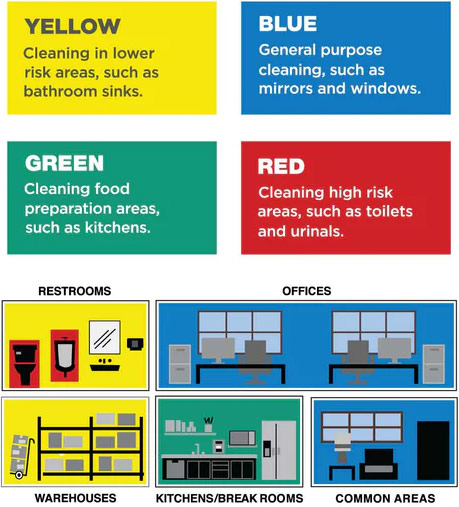Phone:
0154 356 0013
Physical address:
18 Catshill Road, Brownhills, Walsall, WS8 6BL
It was in the late 1990s that The British Institute of Cleaning Science (BICSc) first began to develop a universal colour code which would be recommended for use for the cleaning industry.

BICSc believes all materials within a hospital janitorial cupboard should be colour coded including; cloths, mops, buckets, aprons, and gloves. Over the years the BICSc has reviewed its recommendations to align with those from organisations such as the National Patient Safety Agency.
Colour coded cleaning is the process of designating colours to cleaning equipment in certain areas of a venue, reducing the spread of germs across areas and increasing hygiene throughout a business or home. The four main colours used and to separate out areas such as bars, public areas, kitchen & food preparation areas and washrooms, are red, blue, green and yellow.
From 1 January 2006, a number of new food and hygiene legislations were applied to the UK. As good practice, the Food Standards Agency suggested that separate cleaning equipment such as cloths, sponges and mops, should be used in areas where ready-to-eat foods are stored, handled and prepared.
Colour coding is used throughout a variety of industries and trades where health and safety is paramount, in particular catering and healthcare as cross contamination will lead to illness. The cleaning equipment colours are representative to their area of use. For example, you would not want to clean the floors of a kitchen with a mop that has been previously used to clean the bathroom floors. Colour coding can be broken down into 4 areas:
For this system to work, you will need to assign a different mop (and other cleaning equipment) to each area, with a colour handle, head or bristles to make it easily identifiable. This hygienic cleaning system can be applied to any cleaning equipment that is used in each area; from mops and brushes to cloths and gloves.